PowerPoint Single-Slide Case Study Presentation Template
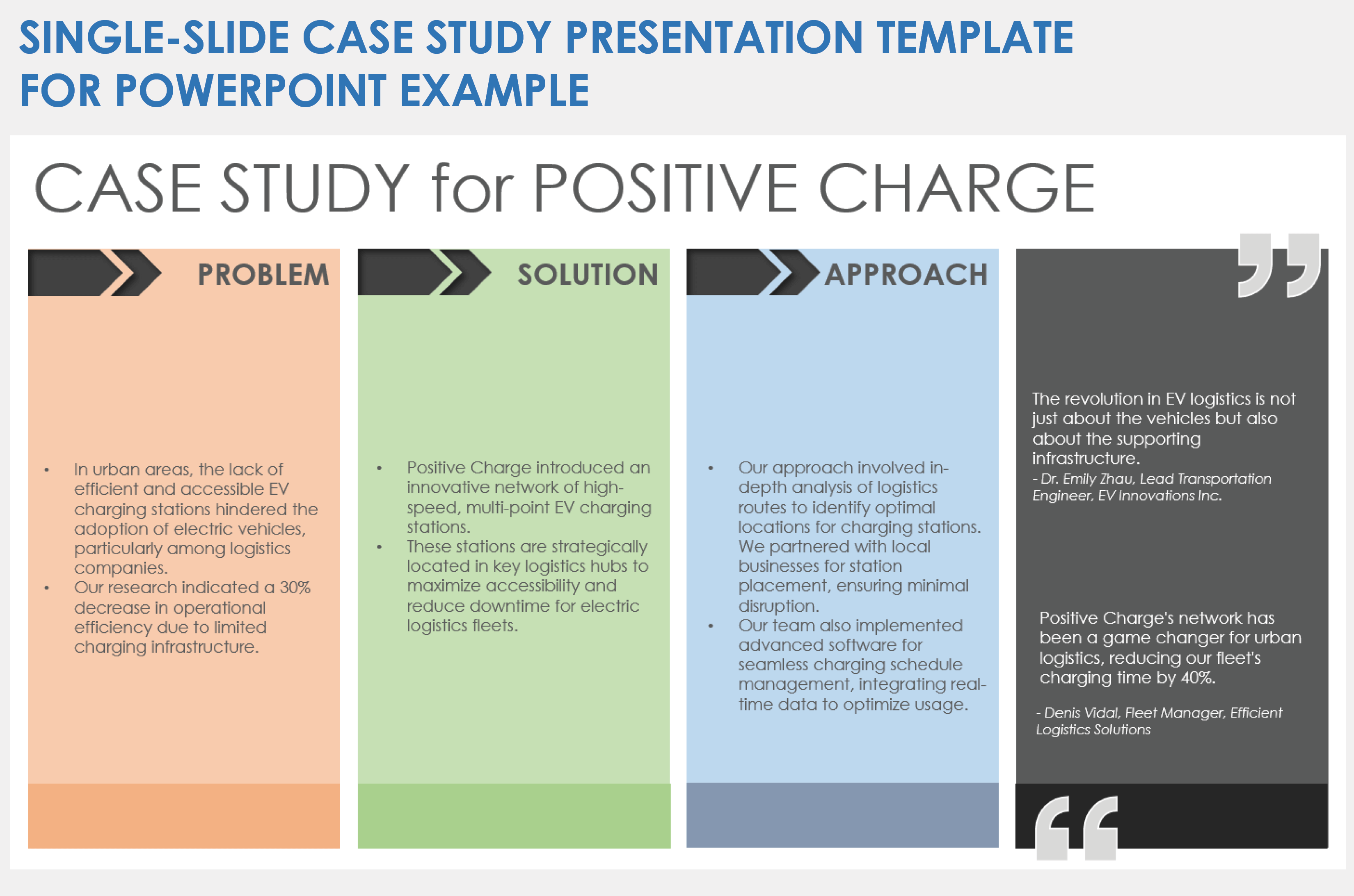
Download the Sample Single-Slide Case Study Presentation Template for PowerPoint
Download the Blank Single-Slide Case Study Presentation Template for PowerPoint
When to Use This Template: Use this single-slide case study presentation template when you need to give a quick but effective overview of a case study. This template is perfect for presenting a case study when time is limited and you need to convey key points swiftly.
Notable Template Features: You can fit everything you need on one slide. Download the version with sample text to see how easy it is to complete the template. Unlike more detailed templates, it focuses on the main points, such as the problem, solution, approach, and results, all in a compact format. It's great for keeping your audience focused on the key aspects of your case study without overwhelming them with information.
PowerPoint Marketing Case Study Template
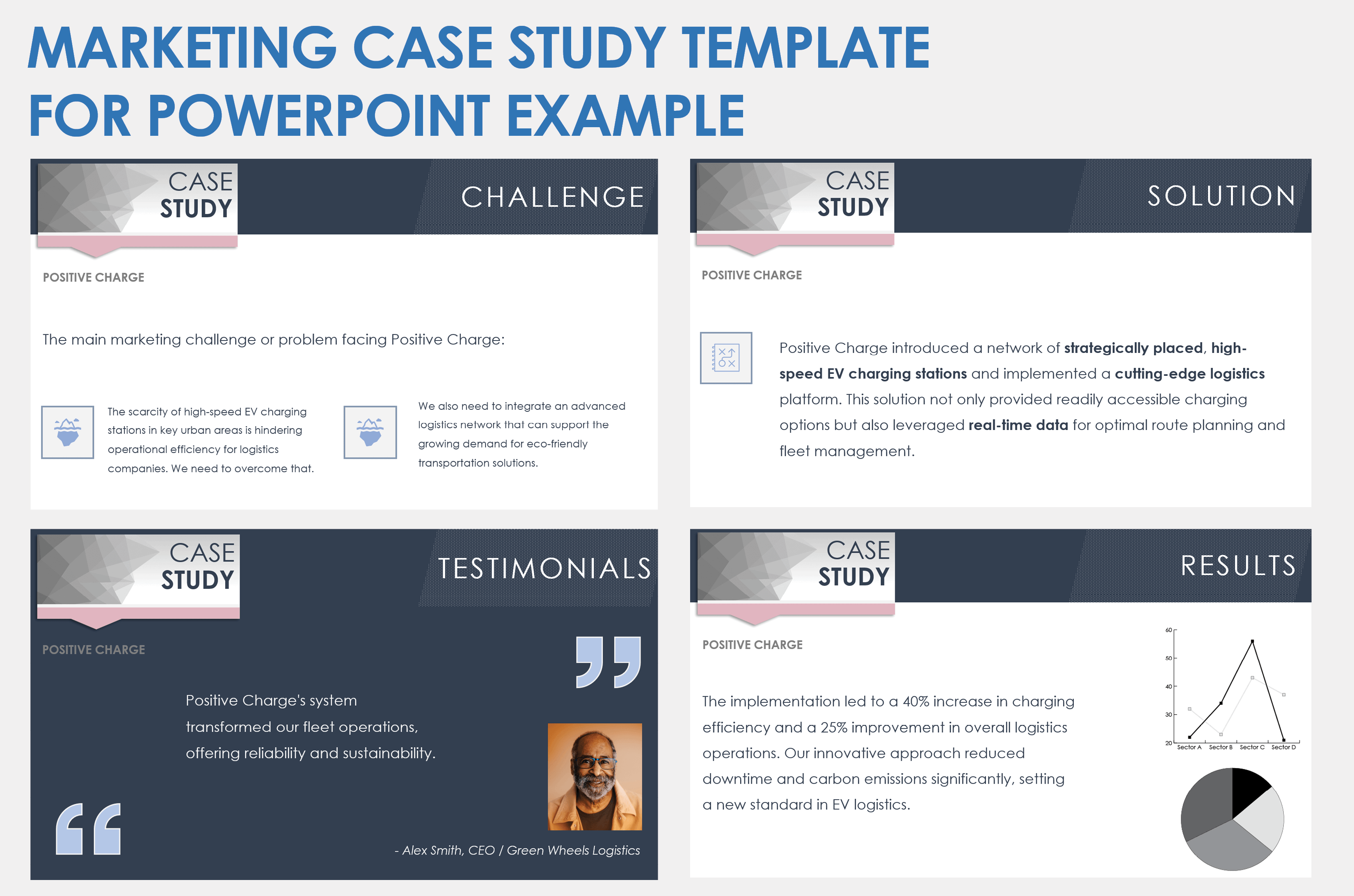
Download the Sample Marketing Case Study Template for PowerPoint
Download the Blank Marketing Case Study Template for PowerPoint
When to Use This Template: Choose this marketing case study template when you need to dive deep into your marketing strategies and results. It's perfect for marketing managers and content marketers who want to showcase the detailed process and successes of their campaigns.
Notable Template Features: This template focuses on the detailed aspects of marketing strategies and outcomes. It includes specific sections to outline business needs, results, and strategic approaches.
PowerPoint Problem-Solution-Impact Case Study Template
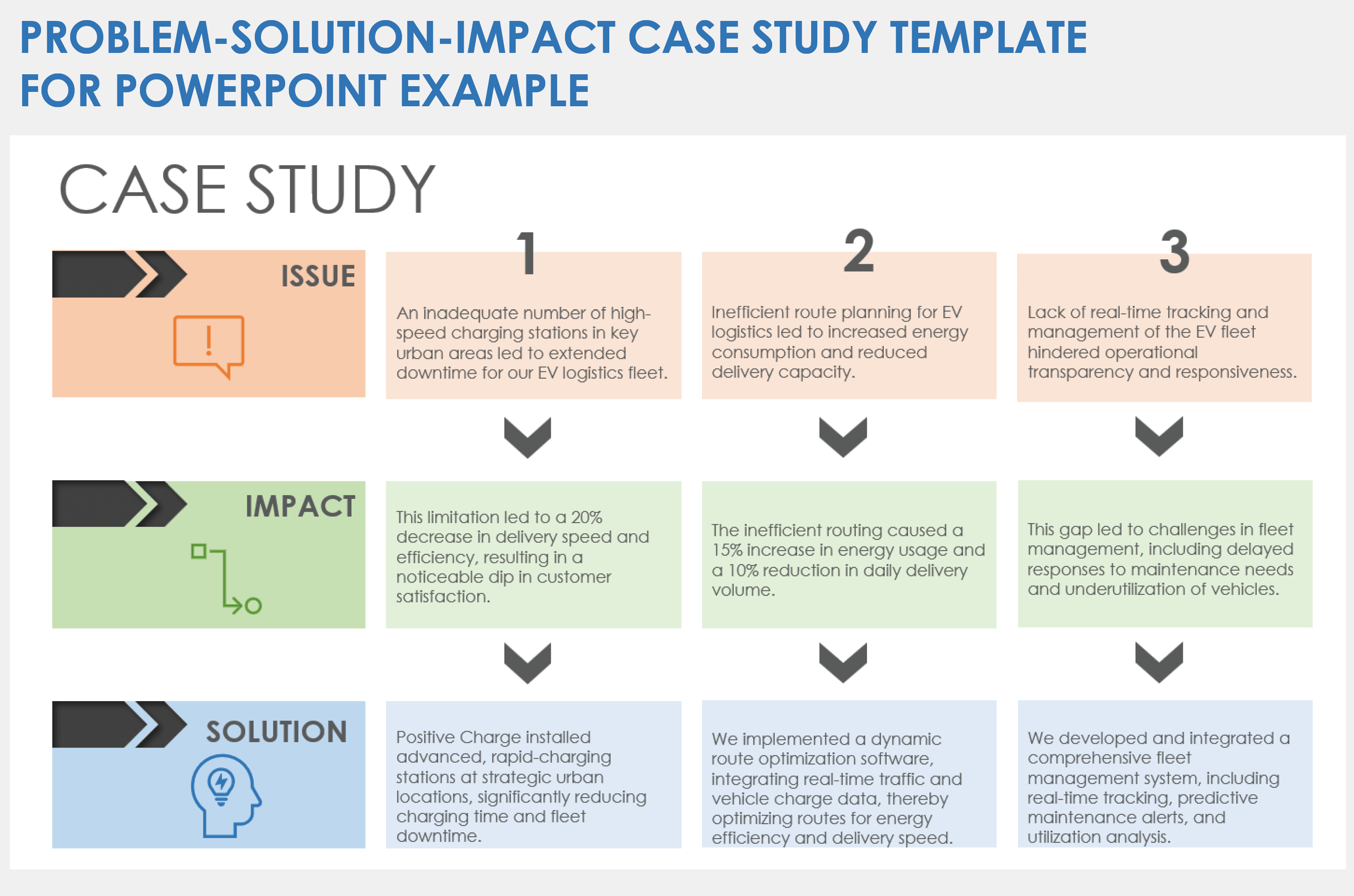
Download the Sample Problem-Solution-Impact Case Study Template for PowerPoint
Download the Blank Problem-Solution-Impact Case Study Template for PowerPoint
When to Use This Template: This problem-solution-impact case study template is useful for focusing on how a challenge was solved and the results. Project managers and strategy teams that want to clearly portray the effectiveness of their solutions can take advantage of this template.
Notable Template Features: This template stands out with its clear structure that breaks down the case into problem, solution, and impact. Use the template — available with or without sample data — to help you tell a complete story, from the issue faced to the solution and its results, making it perfect for presentations that need to show a clear cause-and-effect relationship.
PowerPoint Comparative Study Template
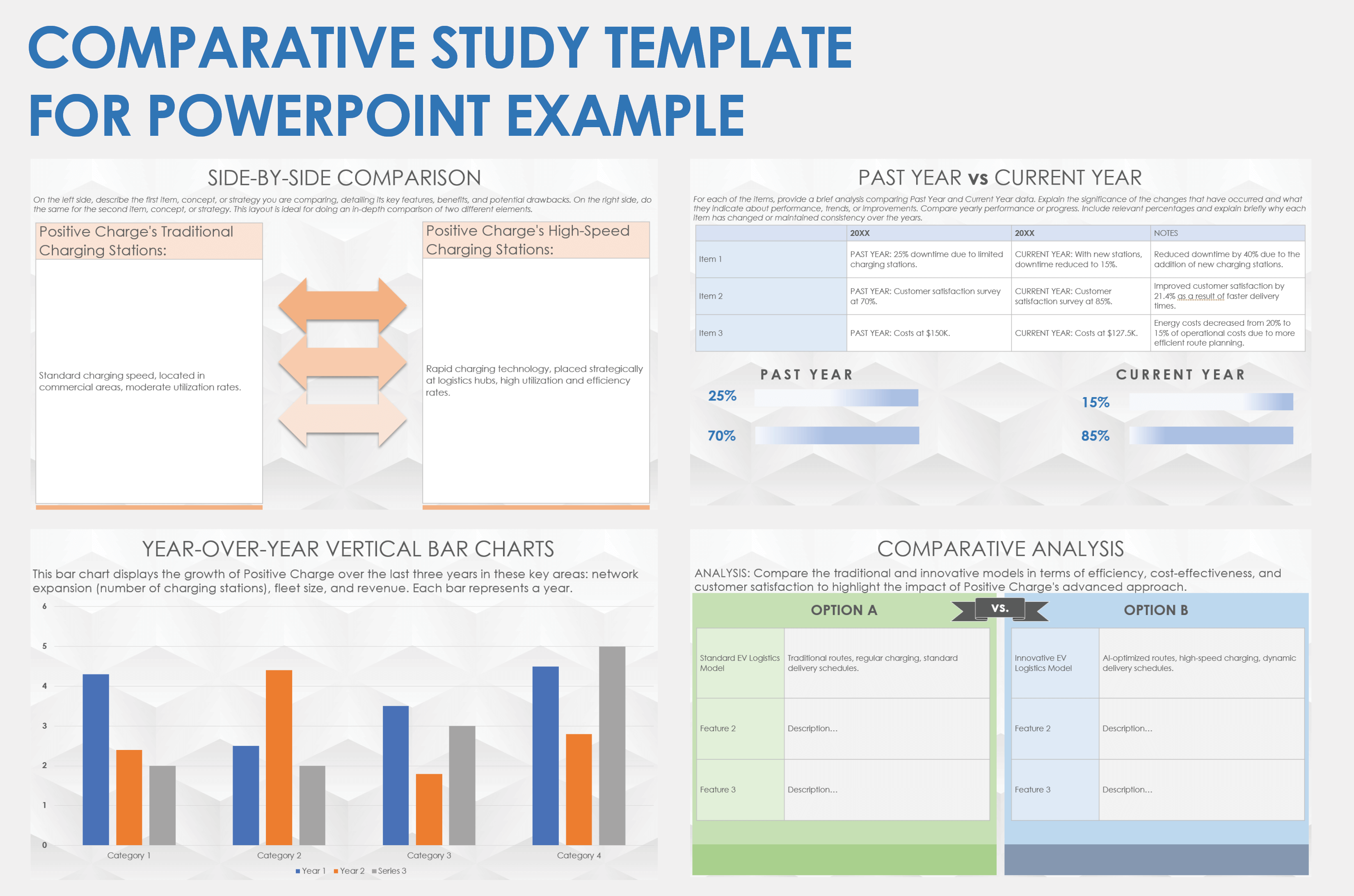
Download the Sample Comparative Study Template for PowerPoint
Download the Blank Comparative Study Template for PowerPoint
When to Use This Template: Choose this comparative study template — available with or without sample data — to illuminate how different products, strategies, or periods stack up against each other. It's great for product managers and research teams who want to do side-by-side comparisons.
Notable Template Features: This template lets you put things next to each other to see their differences and similarities, with a focus on direct comparisons. Use the columns and split slides to make the content easy to understand and visually appealing, perfect for highlighting changes or different approaches.
PowerPoint Customer Journey Case Study Template
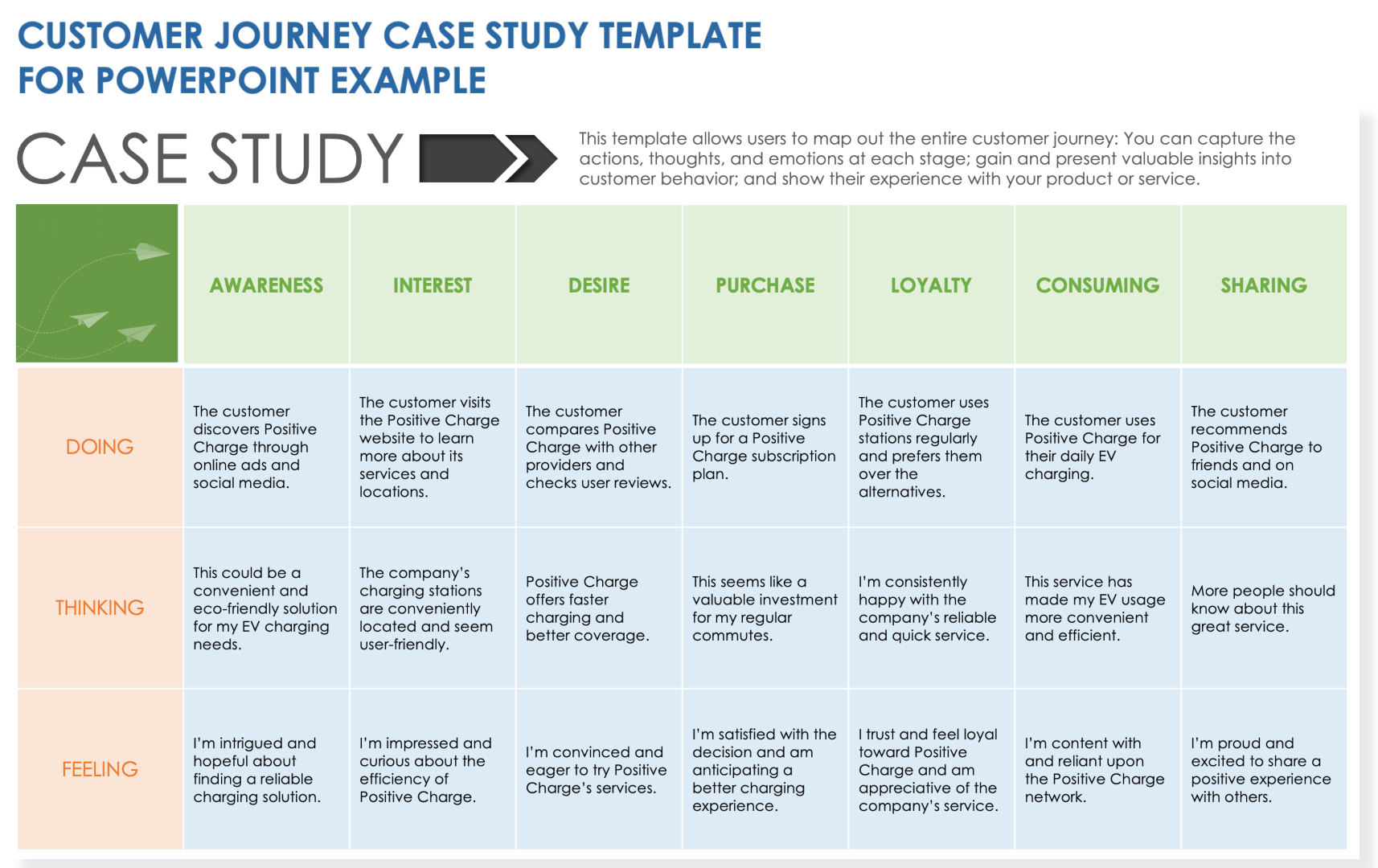
Download the Sample Customer Journey Case Study Template for PowerPoint
Download the Blank Customer Journey Case Study Template for PowerPoint
When to Use This Template: This template is useful for customer experience managers and UX designers who need to understand and improve how customers interact with what they offer. Use the customer journey case study template with sample data to see how to show every step of a customer's experience with your product or service.
Notable Template Features: This template focuses on the whole path a customer takes with a product or service. It follows them, from first learning about the offering to after they buy it.
PowerPoint Case Study Storyboard Template
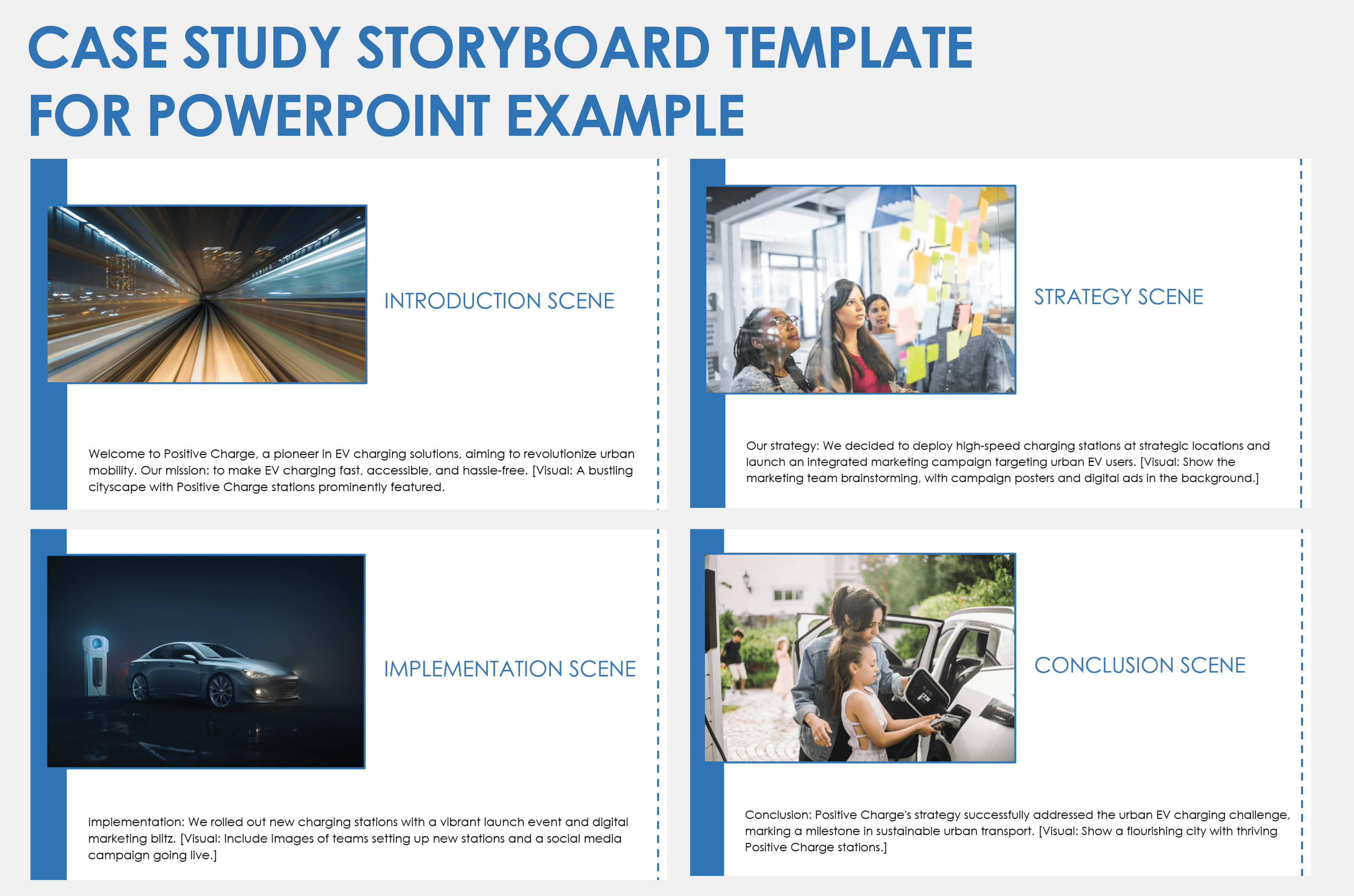
Download the Sample Case Study Storyboard Template for PowerPoint
Download the Blank Case Study Storyboard Template for PowerPoint
When to Use This Template: Creative teams and ad agencies should use this case study storyboard template — with or without sample data — to tell a story using more images than text.
Notable Template Features: This template transforms a case study into a visual story. Effectively communicate the journey of a business case, from the challenges faced to the solutions implemented and the results achieved.
Key Components of Successful Case Study Presentations
The key components of successful case study presentations include clear goals, engaging introductions, detailed customer profiles, and well-explained solutions and results. Together they help you present how your strategies succeed in real-world scenarios.
The following components are fundamental to crafting a compelling and effective marketing case study presentation:
- Clear Objective: Define the goal of your case study, ensuring it addresses specific questions or goals.
- Engaging Introduction: Start with an overview of the company, product, or service, as well as the context to provide necessary background information.
- Customer Profile: Detail your target customer demographics and their needs to help the audience understand who the marketing efforts are aimed at and their relevance.
- The Challenge: Clearly articulate the primary problem or issue to overcome to establish the context for the solution and strategy, highlighting the need for action.
- Solution and Strategy: Describe the specific strategies and creative approaches used to address the challenge. These details should demonstrate your approach to problem-solving and the thought process behind your decisions.
- Implementation: Explain how the solution was put into action to show the practical application. This description should bring your strategy to life, allowing the audience to see how you executed plans.
- Results and Impact: Present measurable outcomes and impacts of the strategy to validate and show its effectiveness in real-world scenarios.
- Visual Elements: Use charts, images, and infographics to make complex information more accessible and engaging, aiding audience understanding.
- Testimonials and Quotes: Include customer feedback or expert opinions to add credibility and a real-world perspective, reinforcing your strategy’s success.
- Lessons Learned and Conclusions: Summarize key takeaways and insights gained to show what the audience can learn from the case study.
- Call to Action (CTA): End with an action you want the audience to take to encourage engagement and further interaction.
Different Types of Case Study Presentations
The types of case study presentations include those that compare products, showcase customer journeys, or tell a story visually, among others. Each is tailored to different storytelling methods and presentation goals.
The following list outlines various types of case study presentations:
- Problem-Solution-Impact Case Study: This type focuses on a clear narrative structure, outlining the problem, solution implemented, and final impact. It's straightforward and effective for linear stories.
- Comparative Case Study: Ideal for showcasing before-and-after scenarios or comparisons between different strategies or time periods. This option often uses parallel columns or split slides for comparison.
- Customer Journey Case Study: Centered on the customer's experience, this option maps out their journey from recognizing a need to using the product or service, and the benefits they gained. It's a narrative-driven and customer-focused case study format.
- Data-Driven Case Study: Emphasizing quantitative results and data, this format is full of charts, graphs, and statistics. This option is perfect for cases where numerical evidence is the main selling point.
- Storyboard Case Study: Use this type to lay out the case study in a storytelling format. This option often relies on more visuals and less text. Think of it as a visual story, engaging and easy to follow.
- Interactive Case Study: Designed with clickable elements for an interactive presentation, this type allows the presenter to dive into different sections based on audience interest, making it flexible and engaging.
- Testimonial-Focused Case Study: This format is best for highlighting customer testimonials and reviews. It leverages the power of word of mouth and is highly effective in building trust.
Expert Tips for Case Study Presentations
Expert tips for case study presentations include knowing your audience, telling a clear story, and focusing on the problem and solution. They can also benefit from using visuals and highlighting results.
“Case studies are one of the most powerful tools in an organization’s marketing arsenal,” says Gayle Kalvert, Founder and CEO of Creo Collective, Inc., a full-service marketing agency. “Done correctly, case studies provide prospective buyers with proof that your product or service solves their business problem and shortens the sales cycle.”

“Presentations are probably the most powerful marketing asset, whether for a webinar, a first meeting deck, an investor pitch, or an internal alignment/planning tool,” says marketing expert Cari Jaquet. “Remember, the goal of a case study presentation is not just to inform, but also to persuade and engage your audience.”

Use these tips to make your presentation engaging and effective so that it resonates with your audience:
- Know Your Audience: Tailor the presentation to the interests and knowledge level of your audience. Understanding what resonates with them helps make your case study more relevant and engaging.
“Presentations can also be a forcing function to define your audience, tighten up your mission and message, and create a crisp call to action,” explains Jaquet. - Tell a Story: Structure your case study like a story, with a clear beginning (the problem), middle (the solution), and end (the results). A narrative approach keeps the audience engaged.
- Focus on the Problem and Solution: Clearly articulate the problem you addressed and how your solution was unique or effective. This section is the core of a case study and should be given ample attention.
- Use Data Wisely: Incorporate relevant data to support your points, but avoid overwhelming the audience with numbers. Use charts and graphs for visual representation of data to make it more digestible.
- Highlight Key Results: Emphasize the impact of your solution with clear and quantifiable results. This could include increased revenue, cost savings, improved customer satisfaction, and similar benefits.
- Incorporate Visuals: Use high-quality visuals to break up text and explain complex concepts. Consider using photos, infographics, diagrams, or short videos.
“I put together the graphics that tell the story visually. Speakers often just need a big image or charts and graphs to help guide their talk track. Of course, if the audience expects details (for example, a board deck), the graphic helps reinforce the narrative,” shares Jaquet. - Include Testimonials: Adding quotes or testimonials from clients or stakeholders adds credibility and a real-world perspective to your presentation.
- Practice Storytelling: A well-delivered presentation is as important as its content. Practice your delivery to ensure you are clear, concise, and engaging.
At this point, it also makes sense to solicit feedback from stakeholders. Jaquet concurs: “Once my outline and graphics are in place, I typically circulate the presentation draft for review. The feedback step usually surfaces nuances in the story or key points that need to show up on the slides. There is no point in building out tons of slides without alignment from the speaker or subject matter experts.” - End with a Strong Conclusion: Summarize the key takeaways and leave your audience with a final thought or call to action.
- Seek Feedback: After your presentation, request feedback to understand what worked well and what could be improved for future presentations.
Remember:
“Don't underestimate the power of a great presentation. And don't wait until the last minute or try to invent the wheel on your own,” advises Jaquet. “Many times, getting the next meeting, winning the deal, or getting the project kicked off well, requires your audience to understand and believe your story.”
Streamline and Collect All the Elements Needed for a Case Study with Smartsheet
Empower your people to go above and beyond with a flexible platform designed to match the needs of your team — and adapt as those needs change. The Smartsheet platform makes it easy to plan, capture, manage, and report on work from anywhere, helping your team be more effective and get more done. Report on key metrics and get real-time visibility into work as it happens with roll-up reports, dashboards, and automated workflows built to keep your team connected and informed. When teams have clarity into the work getting done, there’s no telling how much more they can accomplish in the same amount of time. Try Smartsheet for free, today.